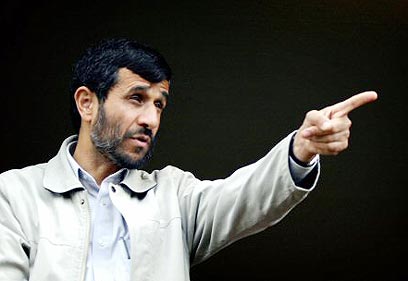Earlier, the International Atomic Energy Agency said that Iran has defied a U.N. Security Council call for a freeze on enriching uranium and its lack of cooperation with nuclear inspectors was a "matter of concern."
Bush said he was not discouraged by Iran's vow to continue despite global pressure, and while he has refused to rule out the possibility of military action against Iran, he emphasized the pursuit of diplomatic efforts.
"I think the diplomatic options are just beginning," he said in Washington.
He said the IAEA statement was important: "It reminds the nations of the world that there is an ongoing diplomatic effort to convince the Iranians to give up their nuclear weapons ambitions."
The eight-page report said that after more than three years of an IAEA investigation of Iran's nuclear program, "the existing gaps in knowledge continue to be a matter of concern."
"Any progress in that regard requires full transparency and active cooperation by Iran," said the report, written by IAEA chief Mohamed ElBaradei.
The finding set the stage for a showdown in the U.N. Security Council, which is expected to meet next week and start a process that could result in punitive measures against the Islamic republic.
John Bolton, U.S. ambassador to the United Nations, said "the United States is ready to take action in the Security Council to move to a resolution. ... We hope that we can get council action just as soon as possible."
Bolton said the IAEA report shows that Iran "has accelerated its efforts to acquire nuclear weapons although, of course, the report doesn't make any conclusions in that regard."
"I think the evidence of Iran's efforts to acquire nuclear weapons, its extensive program to achieve a ballistic missile program of longer and longer range and greater accuracy constitutes a classic threat to international peace and security, especially when combined with Iran's long status as the world's leading state sponsor of terrorism," he added.

Iran's Ahmadinejad. Not moved by report (Photo: Reuters)
Russian Deputy Foreign Minister Sergei Kislyak said it was premature to comment on the IAEA report.
"We will study this report very carefully with the aim of agreeing a position and possible future steps to resolve the issues surrounding the Iranian nuclear problem," the Interfax news agency quoted him as saying.
French Foreign Minister Philippe Douste-Blazy said the IAEA's report was "a worrying situation for the entire international community," but he added that the message to Iran was "the door to negotiation is not closed."
The German government also insisted that only a negotiated solution can resolve the dispute over Iran's nuclear program, even after the International Atomic Energy Authority said Tehran continues to defy the United Nations.
"We maintain that the only solution is a diplomatic one," Foreign Minister Frank-Walter Steinmeier said.
The report said Iran's claim to have enriched small amounts to a level of 3.6 percent — fuel-grade uranium as opposed to weapons-grade enriched to levels above 90 percent — appeared to be true, according to initial IAEA analysis of samples.
Uranium conversion — an activity linked to enrichment — "is still ongoing," said the report, adding that more than 120 tons have been converted over the past eight months. Were it used for weapons, that amount would be enough for more than 15 crude nuclear bombs, according to experts.
U.S. preparing for economic siege on Iran
In one of the few recent developments in the IAEA's inquiry, the report concluded that Iran used undeclared plutonium in conducting small-scale separation experiments.
"The agency cannot exclude the possibility ... that the plutonium analyzed by the agency was derived from source(s) other than declared by Iran," the report said. Plutonium separation is one of the suspect "dual use" activities that could be used for a weapons program.
But the agency was stonewalled by Iran's refusal to give more information on other key issues — details of its centrifuge programs that are used to enrich uranium, information on drawings that show how to form fissile uranium into warheads, and apparent links between Iran's military establishment and what it says is a civilian nuclear program.
The report formally served notice that Tehran had shrugged off a 30-day deadline to meet council demands. As such, it opened the way for further council steps, including the potential threat of sanctions and military action if Iran continues to defy the international community.
John Bolton said the resolution should be under Chapter 7 of the U.N. Charter "making mandatory for Iran the existing requirements of the IAEA resolutions, and particularly the resolution the board passed in February." Chapter 7 resolutions can be enforced by sanctions, or militarily.
As recently published by Ynet, sources in Washington revealed that the U.S. is considering presenting a resolution to the Security Council to impose sanctions on Iran, if Russia and China do not cooperate. The aim is to cause the Russians to "sweat" and take a clear stance on the matter.
The U.S. is already preparing for the possibility of establishing an external body to the Security Council which will include Britain, France, Germany, Japan and other industrialized countries and will impose an economic siege on Iran. Sources in Washington made it clear that the United States would allow diplomatic talks with the Russians and Chinese for a number of days only before deciding on its next move.















